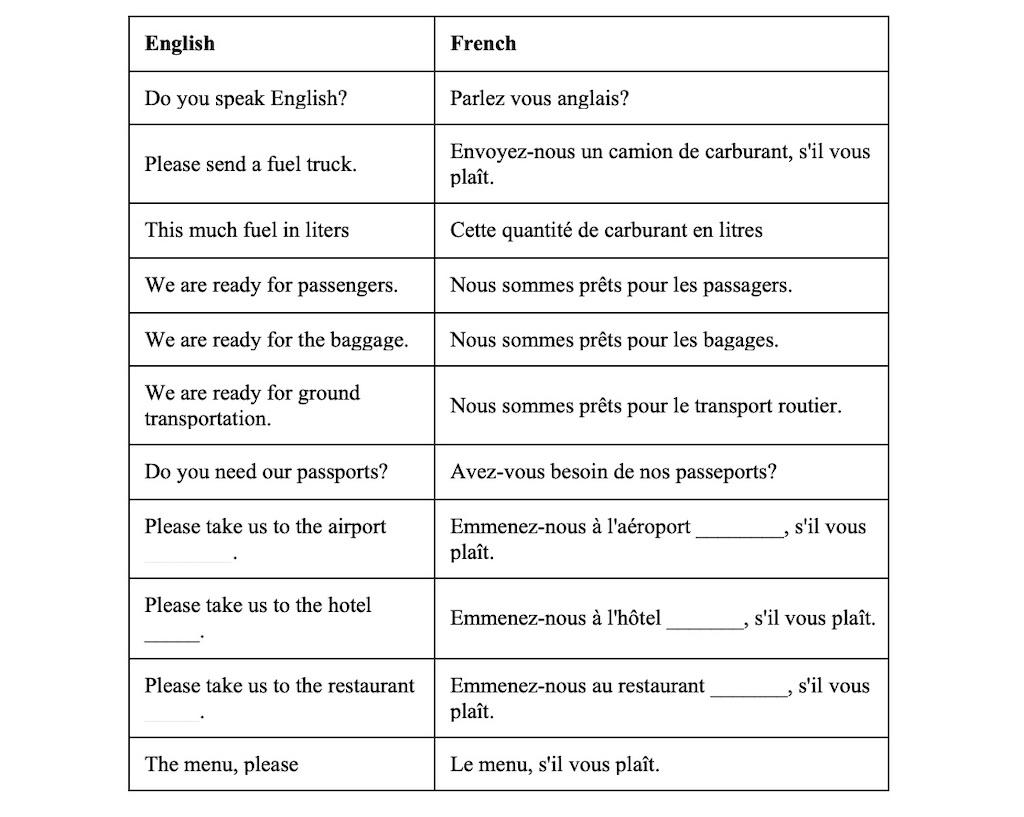
Before you travel beyond your own borders you need to make sure you can communicate at your destination
It is said that English is the language of international aviation and I suppose that is true. The problem is that not everyone knows that. Even if they do, their version of English can be different than yours. Before you venture beyond your own borders you need to make sure you can communicate at your destination.
Optimally, you will have brought someone fluent in the local language. Alternatively, you can arm yourself with the key phrases you will need to work with air traffic control, airport handlers and everyone you plan to interact with. You should also learn enough of the local customs so you don’t offend anyone unintentionally and will be welcomed as a return visitor.
But even after you’ve done all that, you will need to be flexible and keep your sense of humor. No matter what you do, it won't be perfect. Have you heard the story of President John F. Kennedy going to the Berlin Wall and saying to a large crowd, "We are all jelly donuts," supposedly to the horror of the locals as reported by the American press corps? As it turns out, what Kennedy said, "Ich bin ein Berliner," does indeed mean "I am a Berliner" to those in Berlin and Eastern Germany. In those regions, a donut is a “pfannkuchen,” whereas a “berliner” is a donut in North, West and Southwest Germany. “Ich bin Berliner” is what a local who is actually a resident of Berlin would say, but to be figurative, German grammar requires the “ein” be used, as Kennedy correctly did.
Know What to Expect

We can become complacent when traveling overseas, especially if we've had great success before. If you haven't been to the location before, you should find someone who has been there recently. In most parts of the world air traffic controllers speak English, but their accent may be so heavy you may have trouble understanding them. Even if the controller is understandable, they will often switch to the local language when speaking with other aircraft; your situational awareness may be diminished as a result.
If you are staying near a major city with frequent visitors and businesspeople from English-speaking countries, it will be easier to find cab drivers and people in hotels and restaurants who will lend a sympathetic ear. But the farther from these tourist spots you venture, the more likely you are to find yourself incommunicado. Fortunately, there are countermeasures to this, though the most effective solution will not be without cost.
Consider Bringing or Hiring a Translator

I flew U.S. diplomatic missions as an Air Force pilot in a former life and when traveling to a location where a language barrier was known to exist, we had a member of the U.S. Embassy greet us and provide translation services. In extreme cases, we would have the translator meet us prior to departure, just in case we needed them when talking with air traffic control. Having a person available who knows the language and the customs is obviously convenient. Many times it is a luxury, but sometimes it is a necessity.
Now, as a civilian pilot, my international travels are either for business or leisure purposes. For business trips, the passengers should anticipate the same challenges and may have brought someone conversant in the local language. In those cases, I like to ask the person for a few phrases that I know I will need, but more on that later. I also ask for their cellphone number, just in case. For leisure trips, chances are the passengers will want to go someplace where other tourists are, and English may be common. If not, we will explore our options for tourist-friendly hotels and look for local allies.
Use the Local Handler or Hotel Concierge

There is debate among business jet pilots regarding whether to pay for a local handler to ensure everything goes smoothly. “Why pay for something you can do for yourself?” Or, “It pays to have someone with a vested interest in your success.” I like knowing that help is only a phone call away.
If you are a frequent visitor and use the same handler each time, it can be to your benefit to "tip heavy" on arrival and ask if you can call now and then for help. I was once presented with the last-minute task of procuring the finest Parisian pastries and ensuring they got onboard the aircraft within minutes of departure, free from any extra handling sure to happen once they showed up on the conveyer belt at customs. Our handler called in a few favors and the pastries left the baker’s van under the watchful eye of a customs officer as they were brought directly to our aircraft.
You can also find a translation ally at the hotel concierge. In some countries the hotel desk is eager to please; in others a large tip can improve their willingness to come to your rescue in the future. Put their phone number in your cellphone’s contacts list. A quick phone call can solve your problems by asking "how do you say?" or "please talk to this person and ask for me" and then handing the phone over. But no matter how much on-call assistance you have, knowing a few key phrases can make your life much easier.
Babel Fish

The Tower of Babel is a Bible story (Genesis 11:1-9) meant to explain why the world’s populations speak different languages. While it is a good story, my favorite adaptation of it comes from the Douglas Adams book, The Hitchhiker’s Guide to the Galaxy. It describes a Babel fish as, “probably the oddest thing in the universe.” Babel fish, it seemed, digested language of any kind and out the other end came language the person in whose ear he (or she) was placed could understand. How nice.
I don't know of any babel fish available on Earth, so over the years I’ve recorded the translations to commonly needed phrases when venturing to airports in other countries. I would ask a local or someone fluent in the language to vet the translations, and I called the result a Babel fish. For example, here is my French Babel fish.

Don’t be afraid to show your Babel fish to the person you are speaking with, and try your best to pronounce the words. Most people will appreciate your effort. If that doesn’t work, point to the phrase and perhaps they will understand. This form of pointing to what you intend to say can be very useful even without a Babel fish.
In the second part of this feature, we’ll provide additional tips for getting around in a non-English-speaking country.

Comments